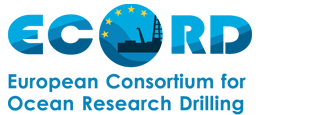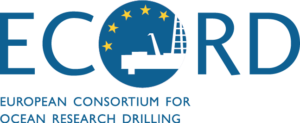JEODI is a research project supported by the European Commission from September 2001 until December 2003 under the 5th Framework Programme (FP5) contributing to the implementation of the Key Action 2 “Global Change, Climate and Biodiversity” within the Energy, Environment and Sustainable Development (Contract N° EVR1-CT-2001-20003).
ORGANISATION
The first role of the JEODI Thematic Network was to work with European scientists to prepare a portfolio of conceptual advanced drilling targets (drill-hole prognoses), involving an evaluation of drilling conditions at various depths (geological and geotechnical conditions, temperature, pressure, stresses, fluids). In particular, JEODI has explored new ways of linking European technological capabilities with these scientific requirements. On the basis of these technological capabilities, JEODI has defined a science plan for oceanic drilling through to 2010. This plan includes all potential platforms for future scientific drilling and will underline key scientific objectives from an European perspective. Of particular importance is the development of a scientific rational for drilling and definition of the technological requirements for scientific drilling in the Arctic. JEODI has also fostered links with related international scientific programmes such as ICDP – International Continental Drillling Programme, IMAGES, and with scientific programmes in individual European countries. In particular, research will be proposed for drilling related to the fields of climate-change, risks, gas hydrates, deep-offshore resource development, and to ongoing European Community projects: DeepBugs, Hydratec, OMARC, Costa, Geomound, DGLab Corinth.
The primary result is a portfolio of drilling targets and experiments for the Integrated Ocean Drilling Programme (IODP) using Mission-Specific Platforms – MSPs, and due to commence in 2003, involving a 10 year implementation plan for drilling.
In addition JEODI has developed ECORD, a European consortium managing Europe as part of IODP in order to obtain a maximum impact for Europe.
PRESENTATION
JEODI aimed to bring a distinctive European component (partners from 15 member states) to a new era of scientific drilling due to commence in Autumn 2003. This Thematic Network has emphasised :
– European experience and skill of using and operating “Alternate Platform” drilling technologies to improve the programme’s shallow-water drilling capabilities,
– Arctic Science, with drilling of the almost wholly unexplored Arctic Ocean,
– Provision of shore based laboratories and other facilities to handle, process, curate and store core derived from these drillling activities,
DELIVERABLES
Science
– Providing the technical requirements for an alternative platform programme for scientific drilling – Brussels meeting publication, January 8-9, 2001.
– A portfolio of drilling targets and experiments for scientific ocean drilling – APLACON-Alternate Platform Drilling Conference, Lisbon, May 10-12, 2002
– Integrating the European science plan and the international science objectives for oceanic drilling : creation of the European Science plan website : http://www.bgr.de/ecord/index.html
– Aiming to set up one or more Mission-Specific Platforms in operation in 2004-2005 at part of IODP leads to define a technical strategy for deep coring in ice-covered regions, produce a prioritised portfolio of drilling targets in Arctic waters and a portfolio of logging targets and experiments
– Integrating joint strategies with ICDP
Management – Outreach
– Defining the political structure and funding geometry for a European consortium, ECORD, in ocean drilling leads to the creation of ECORD and its different bodies, ECORD Council, EMA, ESSAC and ESO.
– Proposals and cost estimates for shore-based laboratories as part of an international programme,
– Present a management structure for shore-based facilities in Europe, creation of ESO,
– Produce information brochures on the European role in scientific ocean drilling.
PARTNERS – CONTACTS
Coordinator, France : CNRS-CRPG – John Ludden
Principal contractor, UK : NERC-BGS – Alister Skinner
Principal contractor, Germany : BGR – Jochen Erbacher
Principal contractor, Sweden : SU – Nils Holm and Jan Backman
Member, Norway : NGI – Anders Solheim
Member, Denmark : GEUS – Naja Mikkelsen
Member, Finland : TI – Kari Strand
Member, Iceland : SI – Arny Sveinbjornsdottir
Principal contractor, Netherlands : VUA – Jeroen Kenter
Member, Switzerland : ETH-Zürich – Judith McKenzie
Member, Ireland : DPE-GSI – Peadar MacArdle
Principal contractor, Spain : CSIC – Menchu Comas
Member, Italy : CNR – Enrico Bonatti
Member, Portugal : GRICES – José Monteiro
Acronyms
BGR: Bundesanstalt fƒr Geowissenschaften und Rohstoffe
CNR: Consiglio Nazionale delle Ricerche
CNRS : Centre National de la Recherche Scientifique
CRPG: Centre de Recherches Pétrographiques et Géochimiques
CSIC: Consejo Superior de Investigaciones Cientificas
DPE-GSI: Department of Public Enterprise, Geological Survey of Ireland
ETH-Zürich: Swiss Federal Institute of Technology, Zurich
FNRS: Fonds National de la Recherche Scientifique
GEUS: Geological Survey of Denmark and Greenland
GRICES: Gabinete de Relacoes Internacionais da Ciencia e do Ensino Superior
NERC: Natural Environment Research Council
NGI: Norwegian Geological Institute
SI: Science Institute, University of Iceland
SU: Stockholm University
TI: Thule Institute, University of Oulu
VUA: Vrije Universiteit-Amsterdam

